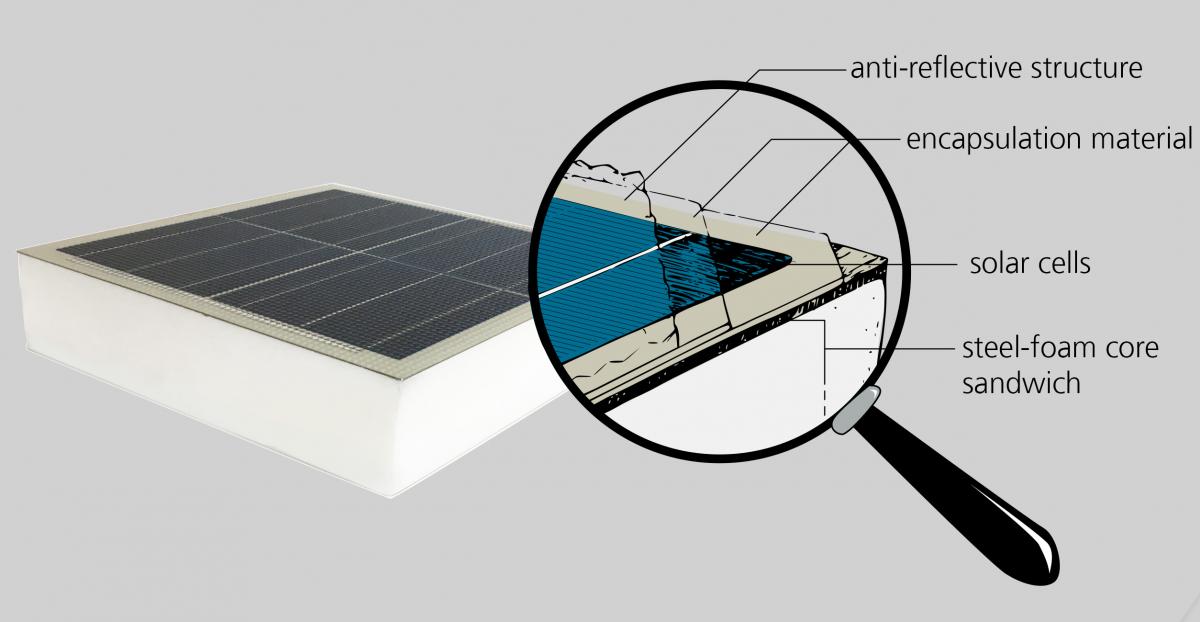Fitting photovoltaic panels to semi-trailers could save up to 1,900 litres of fuel per year, according to a study assessing the economic feasibility of PV in commercial vehicles.
The Fraunhofer Institute for Solar Energy Systems (Fraunhofer ISE) collaborated with logistics firm Dachser and haulage company Benzinger to equip six 40 tonne refrigerated semi-trailers with irradiance sensors for a period of six months. The semi-trailers followed their standard routes in the US and Europe – from Prague to Mallorca, Paris to Munich – and real-life solar irradiance data was collected.
The study also highlighted a need for extremely lightweight and compact PV modules that are able to withstand dynamic mechanical stress caused, for example, by vibrations during travel.

Principle of the vehicle-integrated PV modules for refrigerated semitrailers. Credit: Fraunhofer ISE
Employing photovoltaics in commercial vehicles can contribute to reducing diesel consumption and lowering costs, cutting CO2 emissions from haulage in the process and thus meeting environmental and climate protection targets within the transport sector.
‘In developing a solar-active vehicle shell, we want to make photovoltaic technology available to the logistic sector and contribute to lowering the cost of logistics as a result,’ said Matthieu Ebert, head of the team for Module Efficiency and New Concepts at Fraunhofer ISE.
Unlike other economic sensibility studies conducted on the use of PV in commercial vehicles, which have, to date, been based on simulations with artificial weather data, the Fraunhofer study was able to determine the insolation potential in real-life logistics operations.
Fraunhofer ISE scientists analysed the data to calculate savings in litres of diesel per vehicle, as the average of litres of diesel across all routes and vehicles, and in litres of diesel for three geographic regions.
‘When you merge the data collected for the roofs that could potentially be fitted with PV modules, this allows you to make reliable statements about the viability of such systems,’ said Ebert. ‘Based on our calculations, we anticipate that a 40 tonne refrigerated semitrailer with a roof area of 36m2 equipped with PV modules (nominal power of 6 kW) could save up to 1,900 litres of diesel fuel per year,’ he added.
In order to minimise any additional load on the refrigerated semitrailers, vehicle-integrated PV modules need to be developed that are as lightweight and efficient as possible. Furthermore, a unique design will be required to enable the PV modules to be fitted to vehicle roofs without exceeding the maximum vehicle heights permitted under road traffic regulations.
Such modules must be extremely compact and able to withstand dynamic mechanical stress caused, for example, by vibrations during travel. Fraunhofer ISE is supporting the development of lightweight modules by contributing its many years of expertise in module technology and testing. Specialist synergies at the research institute in the fields of power electronics and systems technology help in developing all the necessary components, and in ensuring that they interact properly within the overall system.
PV modules and systems can also be tested under real conditions in transport operations. Ebert and his team at Fraunhofer ISE offer field tests to interested companies and collaborative partners in the logistics and vehicle construction sectors. The test results can then be used as a basis for individual yield analyses and for calculating savings potential.
One important finding of the study is that the fuel savings, and thus the viability of the initiative, are heavily dependent on vehicle deployment regions and usage scenarios. In future, the insights gained from the measurement campaign will allow Ebert and his team to advise logistics companies on questions regarding the economic viability of using PV, and on the PV technology that is most suited to their needs.
The project was funded by the Fraunhofer Zayed Program and carried out in collaboration with Fraunhofer CSE in Boston.

